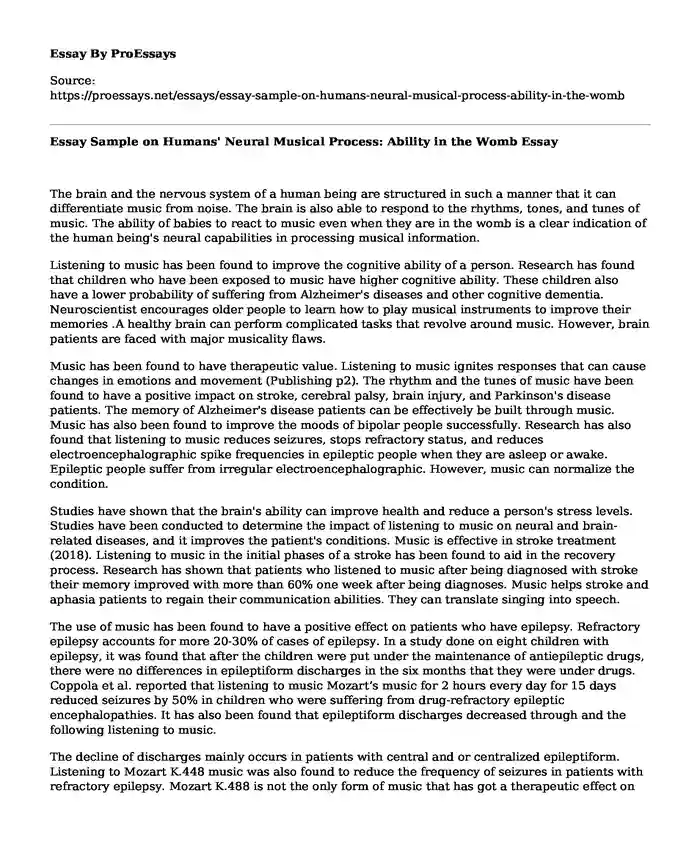The brain and the nervous system of a human being are structured in such a manner that it can differentiate music from noise. The brain is also able to respond to the rhythms, tones, and tunes of music. The ability of babies to react to music even when they are in the womb is a clear indication of the human being's neural capabilities in processing musical information.
Listening to music has been found to improve the cognitive ability of a person. Research has found that children who have been exposed to music have higher cognitive ability. These children also have a lower probability of suffering from Alzheimer's diseases and other cognitive dementia. Neuroscientist encourages older people to learn how to play musical instruments to improve their memories .A healthy brain can perform complicated tasks that revolve around music. However, brain patients are faced with major musicality flaws.
Music has been found to have therapeutic value. Listening to music ignites responses that can cause changes in emotions and movement (Publishing p2). The rhythm and the tunes of music have been found to have a positive impact on stroke, cerebral palsy, brain injury, and Parkinson's disease patients. The memory of Alzheimer's disease patients can be effectively be built through music. Music has also been found to improve the moods of bipolar people successfully. Research has also found that listening to music reduces seizures, stops refractory status, and reduces electroencephalographic spike frequencies in epileptic people when they are asleep or awake. Epileptic people suffer from irregular electroencephalographic. However, music can normalize the condition.
Studies have shown that the brain's ability can improve health and reduce a person's stress levels. Studies have been conducted to determine the impact of listening to music on neural and brain-related diseases, and it improves the patient's conditions. Music is effective in stroke treatment (2018). Listening to music in the initial phases of a stroke has been found to aid in the recovery process. Research has shown that patients who listened to music after being diagnosed with stroke their memory improved with more than 60% one week after being diagnoses. Music helps stroke and aphasia patients to regain their communication abilities. They can translate singing into speech.
The use of music has been found to have a positive effect on patients who have epilepsy. Refractory epilepsy accounts for more 20-30% of cases of epilepsy. In a study done on eight children with epilepsy, it was found that after the children were put under the maintenance of antiepileptic drugs, there were no differences in epileptiform discharges in the six months that they were under drugs. Coppola et al. reported that listening to music Mozart’s music for 2 hours every day for 15 days reduced seizures by 50% in children who were suffering from drug-refractory epileptic encephalopathies. It has also been found that epileptiform discharges decreased through and the following listening to music.
The decline of discharges mainly occurs in patients with central and or centralized epileptiform. Listening to Mozart K.448 music was also found to reduce the frequency of seizures in patients with refractory epilepsy. Mozart K.488 is not the only form of music that has got a therapeutic effect on epileptic children. Other types of music with lower harmonics also have the same impact as Mozart music. From the studies that have been conducted, listening to Mozart’s music can reduce the frequency of seizures and epileptiform discharges in children.
The brains of the people with epilepsy live a different response to music than the mind of the people who are free from epilepsy. High-stress levels increase the frequency of seizures in epileptic patients. However, patients have found listening to music helps them relax and thus lowering their stress levels. Theories have been developed to explain the impact of music in the epileptic brain.
The first theory focuses on the neurotransmitter paths that are followed by music. The person listens to music, the dopamine level in the brain increases. Studies have shown that dopamine plays a role in the pathophysiology of epilepsy. When impaired dopamine goes to the midbrain, it causes seizures in epileptic patients. Research has shown that music reduces the dopamine levels in the striatal and hippocampal parts of the brain. Therefore, listening to music alters dopamine's neurotransmission and, therefore, serves as therapy for epilepsy.
Another theory explaining the therapeutic nature of music in epilepsy revolves around mirror neurons. These neurons modify the behaviour of a person upon stimulation by exposure to audio or visual music. Audio stimulation of the motor neurons affects the motor system. The neurons link the audio music and the motor cortex, impacting the epileptic persons. From research, music has been found to have a positive impact on an epileptic person's brain. Music provides stimulations that reduce stress related to seizures and reduce the frequencies of seizures.
Cite this page
Essay Sample on Humans' Neural Musical Process: Ability in the Womb. (2023, Sep 17). Retrieved from https://proessays.net/essays/essay-sample-on-humans-neural-musical-process-ability-in-the-womb
If you are the original author of this essay and no longer wish to have it published on the ProEssays website, please click below to request its removal:
- Nursing Paper Sample: Nursing Care Models
- Doctors on DNA, Cancer, Renal Failure and Differential Hierarchy Paper Example
- Essay Sample on Greek and Roman Ancient Art: Differences in Human Form & Meaning
- Paper Example on Prescribing Opioids in US: Dentists Lead the Way
- Paper Example on Finite Element Method With Applications in Engineering
- Food Preservation: Retard Microbe Growth & Preserve Quality & Nutrients - Essay Example
- Young African Americans: Hopelessness and Fear in a Painting - Free Essay Example







